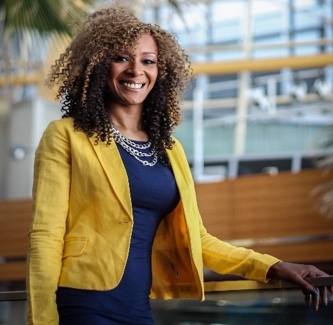Advocacy Through the Eyes of a Survivor
By: Benita Robinson, Crisis Coordinator

A moment in time…. Where everything stands still. Your life is forever altered, sometimes without you realizing it. Sometimes without you knowing if you will make it to the see the end. I will undoubtedly never forget the day, about 10 years ago, I was sexually assaulted and nearly died at the hands of a former intimate partner. It changed the way I thought and moved about the world. It changed the way I viewed people, including myself. I did not have a support system to provide emotional safety and support. No one told me what my options were. I was ashamed, embarrassed, angry, and blamed myself…. I felt alone and coped by burying it. It was a life-changing experience that informs my work as an advocate at Wayne County SAFE for other survivors of sexual assault.
I did not realize it at the time, but my experience was far from an anomaly or unique circumstance. The personal was and is political. Countless people’s lives are colored by sexual violence every day. Advocates from Wayne County SAFE and other organizations that support survivors of sexual violence see it repeatedly when working with survivors of sexual assault. Survivors share feelings of fear, embarrassment, detachment, shame, depression and anger. They are often blamed by others and ostracized by the community. They question their purpose and their lives…. Why an act so horrendous could happen to them. For these reasons, many survivors do not feel supported and do not disclose.
Unfortunately, we see and hear the statistics all the time. According to the National Sexual Violence Resource Center, 1 in 5 women and 1 in 71 men will experience an attempted or completed sexual assault in their lifetimes. 63% of these are never reported to the police. These numbers are even more startling when we consider other intersecting identities such as race, age, sexuality, and gender identity. There are people in our community suffering in silence, some for years and years. They are our friends, family, and neighbors. They sit beside us during service and frequent the same businesses we do. They work and go to school with us. The fact is, whether you realize it or not, there is someone you know that has been victimized by this epidemic.
As we raise awareness around the sexual violence that plagues our society, we should also challenge our own ways of thinking, experiences and how they inform our work and lives. We must continue to ask ourselves: What can we do in our own lives and communities to create a supportive environment for survivors and hostile one for perpetrators? Last month many events, trainings and rallies were held for Sexual Assault Awareness Month, but we must remember it is much more than a time to raise awareness around sexual assault. It is also a time of reflection and revitalization. We must view healing and advocacy through the lens of survivors, even if some of us have not experienced sexual violence firsthand. As a woman of color, survivor and advocate the phrase coined by Founder and Director of Sasha Center Dr. Kalimah Johnson is even more relevant, “Healing is Possible.” Survivors are already resilient but with the support of the community, survivors can experience holistic healing. This month, as we do every day of the year, we honor the diverse survivors of sexual violence Wayne County SAFE serves for their strength and inspiration. From you, we draw our motivation and are revitalized. Because of you, we will continue to fight to ensure your voices are valued and heard.
About Author Benita Robinson
 Benita Robinson is a proud graduate of the University of Michigan-Dearborn. She is a passionate activist for equal rights and access to opportunities for underserved populations in metro Detroit, specifically around issues such as sexual and domestic violence, racial inequality, equal pay, feminism, prison reform and leadership development. She is currently the Crisis Coordinator for Wayne County Sexual Assault Forensic Examiners Program in Detroit, Michigan. In this role, she oversees the First Responder program and specializes in ensuring quality provision of crisis intervention and advocacy services to survivors of sexual assault. Benita also does outreach and community awareness events/trainings. She is also on the advisory board for the University of Michigan-Dearborn’s Women and Gender Studies program and a member of the Michigan Theory Group at Macomb Correctional Facility.
Benita Robinson is a proud graduate of the University of Michigan-Dearborn. She is a passionate activist for equal rights and access to opportunities for underserved populations in metro Detroit, specifically around issues such as sexual and domestic violence, racial inequality, equal pay, feminism, prison reform and leadership development. She is currently the Crisis Coordinator for Wayne County Sexual Assault Forensic Examiners Program in Detroit, Michigan. In this role, she oversees the First Responder program and specializes in ensuring quality provision of crisis intervention and advocacy services to survivors of sexual assault. Benita also does outreach and community awareness events/trainings. She is also on the advisory board for the University of Michigan-Dearborn’s Women and Gender Studies program and a member of the Michigan Theory Group at Macomb Correctional Facility.